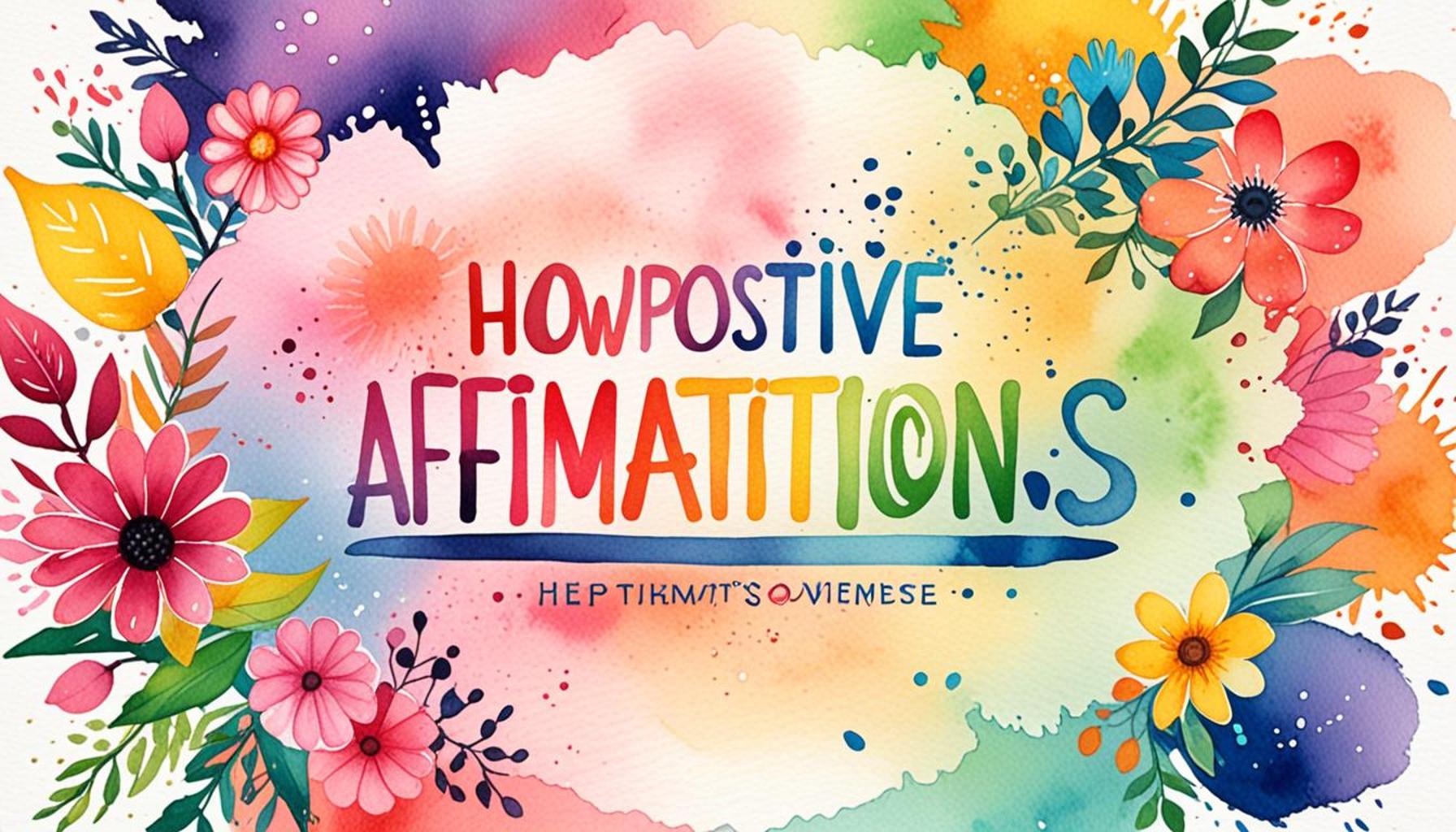How Positive Affirmations Help Overcome Self-Imposed Limits

Understanding the Power of Positive Affirmations
In today’s fast-paced world, many people, particularly in Nigeria, find themselves grappling with self-doubt and limiting beliefs that stifle their potential. These overwhelming feelings often arise from societal norms, cultural pressures, and personal setbacks. Positive affirmations present a robust strategy to confront and redefine these negative thoughts, empowering individuals to push beyond their perceived limitations and embrace their true capabilities.
What Are Positive Affirmations?
At their core, positive affirmations are concise yet profound statements that encapsulate one’s aspirations, strengths, and values. They are not just motivational catchphrases; rather, they serve as daily reminders that promote a healthy relationship with oneself. Here are key features that underscore their importance:
- They promote self-love and acceptance: Affirmations encourage individuals to recognize their intrinsic worth and cultivate a positive self-image, which is a crucial aspect in a society where external validation often overshadows personal esteem.
- They encourage a growth mindset: By focusing on one’s ability to develop skills over time, affirmations help foster resilience and adaptability, vital traits in an ever-changing professional landscape.
- They help visualize and achieve personal goals: Affirmations act as mental blueprints, guiding individuals toward their desired future by reinforcing their commitment and capability to achieve their objectives.
Regular repetition of these affirmations—whether by speaking them aloud, writing them down, or even meditating on them—can lead to significant shifts in mindset. This practice not only enhances self-confidence but also builds emotional resilience against setbacks.
Signs of Self-Imposed Limits
Understanding the barriers created by self-imposed limits can be crucial in overcoming them. For many Nigerians, these barriers manifest in various forms:
- Feeling unworthy of success or happiness: Many individuals struggle with the feeling that they do not deserve the success they seek, which can stem from long-standing cultural beliefs about merit and social hierarchy.
- Avoiding opportunities due to fear of failure: The fear of disappointing family or community expectations can drive people to reject potential opportunities, restricting their growth.
- Underestimating personal abilities: A lack of confidence in one’s skills can lead to missed opportunities for advancement, whether in the workplace or within personal endeavors.
Utilizing positive affirmations can combat these negative patterns, fostering an environment where individuals feel empowered to break free from their limitations and pursue their dreams with vigor.

Embracing Change Through Affirmations
Incorporating positive affirmations into daily life can ignite transformative changes. From workplaces, where team morale can be enhanced through collective affirmations, to personal relationships that thrive on positivity and encouragement, the impact is profound. For instance, consider a group of Nigerian youths preparing for a competitive examination. By chanting affirmations like “I am capable of achieving my goals” together, they create a culture of support that not only motivates them to study harder but also reinforces their belief in collective success.
Discover how embracing these affirmations can reshape your reality and inspire you to foster a mindset filled with optimism and purpose. The journey of self-discovery and empowerment through positive affirmations is not just a personal endeavor; it can ripple through communities, creating a supportive network that champions resilience and growth. By actively transforming negative thoughts into positive ones, individuals can unlock their capabilities and embrace the boundless possibilities that await.
LEARN MORE: This related article may interest you
The Mechanism of Change: How Affirmations Impact Mindset
To truly appreciate the transformative potential of positive affirmations, it is vital to understand how they operate at a psychological level. Affirmations are more than mere words; they are instruments for mental conditioning. By consistently integrating affirmations into daily practices, individuals can effectively retrain their minds and redirect their thoughts from a negative framework to one that promotes growth and self-empowerment.
The Science Behind Affirmations
Research supports the efficacy of positive affirmations in overcoming self-imposed limits. When individuals repeat affirmations, they activate new neural pathways in the brain, gradually replacing outdated beliefs with new perspectives. This process can lead to the following outcomes:
- Enhanced Self-Esteem: Regularly stating affirmations such as “I am worthy of love and success” cultivates self-compassion and defies societal messages that suggest otherwise. This shift not only elevates self-esteem but also instills a belief in individual capabilities.
- Decreased Anxiety: Positive affirmations can help in moderating stress levels. By focusing on affirmations like “I can handle challenges with grace,” individuals are likely to approach stressful situations with a calmer mindset, reducing anxiety and promoting resilience.
- Increased Motivation: Reciting affirmations that align with personal goals—such as “I am dedicated to achieving my dreams”—can serve as a motivational catalyst. This reinforcement encourages individuals to take actionable steps towards their ambitions rather than succumbing to self-doubt.
A Cultural Perspective: Affirmations in the Nigerian Context
In Nigeria, where cultural expectations can weigh heavily on individual aspirations, the practice of positive affirmations holds particular significance. Many young Nigerians face pressures to conform to societal standards that often conflict with personal dreams. By adopting affirmations tailored to their unique circumstances, such as “I am creating my path to success,” individuals can assert their right to pursue unconventional routes without the burden of guilt or inadequacy.
Furthermore, it is essential to note that affirmations can be shared within communal settings, strengthening bonds among peers. In support groups or family gatherings, the collective practice of affirmations can serve as a powerful reminder that self-imposed limits are not to be endured in isolation but challenged together.
As individuals harness the power of positive affirmations, they often begin to witness changes not just in their internal dialogue but also in their external circumstances. This ripple effect can inspire a wider cultural shift where uplifting thought patterns replace limiting beliefs, paving the way for newfound opportunities for success.
Exploring the Power of Positive Affirmations
Positive affirmations serve as a transformative tool in overcoming self-imposed limits, often acting as a catalyst for personal growth and development. By repeatedly expressing empowering statements about oneself, individuals can influence their self-perception, leading to a significant boost in confidence and motivation. This psychological shift enables them to challenge and dismantle the constraints that they have unknowingly placed upon themselves.
One of the fundamental aspects of positive affirmations is their ability to rewire the brain. Consistent affirmation fosters a practice of mindfulness that helps individuals focus on their strengths and possibilities rather than dwelling on limitations. Neuroplasticity, the brain’s ability to form new connections, plays a key role here; by engaging in positive self-talk, individuals can establish new neural pathways aligned with success and self-empowerment.
Moreover, positive affirmations can enhance emotional resilience. When individuals face setbacks, the habit of reciting affirmations acts as a buffer against negative feelings, allowing them to rebound more quickly. The empowering language used in affirmations can replace self-doubt with self-acceptance—setting the stage for better mental health and overall well-being.
As researchers increasingly delve into the scientific foundations of affirmations, evidence suggests that such practices not only improve self-esteem but also impact performance positively, whether in academic settings, workplace environments, or personal relationships. By fostering a growth mindset, affirmations encourage individuals to pursue challenges, adopt new skills, and ultimately experience personal breakthroughs.
The ripple effect of employing positive affirmations can lead to profound changes in behavior, attitudes, and life outcomes. With each affirmation spoken or thought, individuals slowly dismantle the psychological barriers that hinder their potential, leading to a redefined self-image that embraces capability, strength, and above all, limitless possibilities.
| Category | Description |
|---|---|
| Mental Rewiring | Positive affirmations create new neural pathways that promote confidence and self-belief. |
| Emotional Resilience | Affirmations help buffer negative emotions, leading to quicker recovery from setbacks. |
| Performance Improvement | Utilizing affirmations enhances self-esteem, resulting in better performance in various life areas. |
CHECK OUT: Click here to explore more
Empowerment Through Repetition: The Role of Consistency
To maximize the benefits of positive affirmations, consistency is key. Much like a workout routine builds muscles over time, the regular practice of affirmations strengthens mental resilience and encourages a more empowered mindset. This principle is especially relevant in Nigeria, where vibrant yet challenging environments can often contribute to stress and self-doubt. By incorporating affirmations into daily life, individuals can create a mental framework that supports their unique journeys.
The Daily Ritual of Affirmations
Establishing a daily ritual around affirmations can significantly enhance their potency. This could involve setting aside a few moments each morning to recite affirmations, perhaps during a moment of reflection while sipping on a traditional Nigerian beverage like ‘Zobo’ or ‘Chapman’. One might say, “I am capable of turning my dreams into reality,” allowing the words to resonate not just mentally, but emotionally. Over time, these affirmations can become ingrained, empowering individuals to break free from self-imposed limits.
Utilizing Visual Cues
In addition to verbal affirmation, using visual cues can reinforce positive beliefs. Personalizing affirmations by writing them on colorful sticky notes and placing them in visible areas—such as on the walls of a home or on a computer monitor—can serve as constant reminders. In urban spaces like Lagos, where the chaos of the city can easily induce negative thinking, such visual affirmations can provide much-needed motivation amidst distractions. Phrases like “I am a beacon of positivity” or “I attract opportunities” can redefine one’s day-to-day experiences.
The Power of Affirmations in Challenging Situations
A prevalent issue faced by many is the feeling of inadequacy that arises during challenging circumstances, such as job searching or academic pressures. Positive affirmations can serve as a lifeline. For instance, a student battling anxiety over examinations may benefit from affirming, “I am prepared, and I trust my abilities.” This mantra transforms the anxiety into confidence, encouraging proactive study habits rather than paralyzing self-doubt.
Furthermore, the essence of affirmations lies not solely in their repetition but also in their authenticity. Crafting affirmations that resonate personally is crucial for effectiveness. Instead of generic statements, individuals can tailor their affirmations to address specific fears or goals. For instance, a young migrant entrepreneur may affirm, “I have the courage to pursue my business dreams,” reinforcing a mindset that combats the fear of failure.
Building Communities of Support
Implementing positive affirmations can also extend beyond the self. Creating support networks, where peers share and practice affirmations collectively, can foster a sense of belonging and resilience. In Nigerian communities, group affirmations—whether at local events, churches, or informal gatherings—can form a powerful collective force. The impact of shared optimistic statements can amplify the individual benefits, carving out paths toward overcoming communal self-imposed limits.
In essence, the practice of positive affirmations encompasses a wide range of strategies that extend beyond mere repetition. By fostering a culture of affirmation, individuals and communities alike can collaboratively challenge the societal and personal barriers that dictate potential, suggesting that the power of words, when reinforced consistently and shared, can reshape lives in extraordinary ways.
YOU MAY ALSO LIKE: Read read another article
Conclusion: Transforming Mindsets with Affirmations
In summary, the journey of overcoming self-imposed limits is deeply intertwined with the practice of positive affirmations. These affirmations serve as a powerful tool for self-empowerment, resilience, and personal growth, especially in a dynamic society like Nigeria, where external pressures can often shrink one’s ambitions. The act of declaring positive beliefs not only reshapes our internal dialogue but also fosters a belief system that can pave the way for achieving dreams and aspirations.
Moreover, the incorporation of consistency through daily rituals and visual cues reinforces this transformational process, allowing individuals to actively combat self-doubt with intentional thoughts and motivations. As evidenced in various scenarios—from students facing academic challenges to entrepreneurs pursuing their business endeavors—the effectiveness of tailored affirmations can lead to enhanced confidence and actionable outcomes.
In embracing the communal aspect of affirmations, individuals can also cultivate a supportive environment where collective encouragement amplifies personal growth. By engaging in group affirmations, whether in local gatherings or community settings, individuals tap into a shared strength that can break down barriers and redefine possibilities.
Thus, the path to overcoming self-imposed limits is not simply a solitary endeavor; it is a collective journey fueled by the power of words and reflection. As we explore the significance of positive affirmations further, we invite readers to consider how these techniques can create ripples of change in their lives and communities. The potential to reshape narratives and unlock hidden capacities lies within every affirmation spoken and believed.


